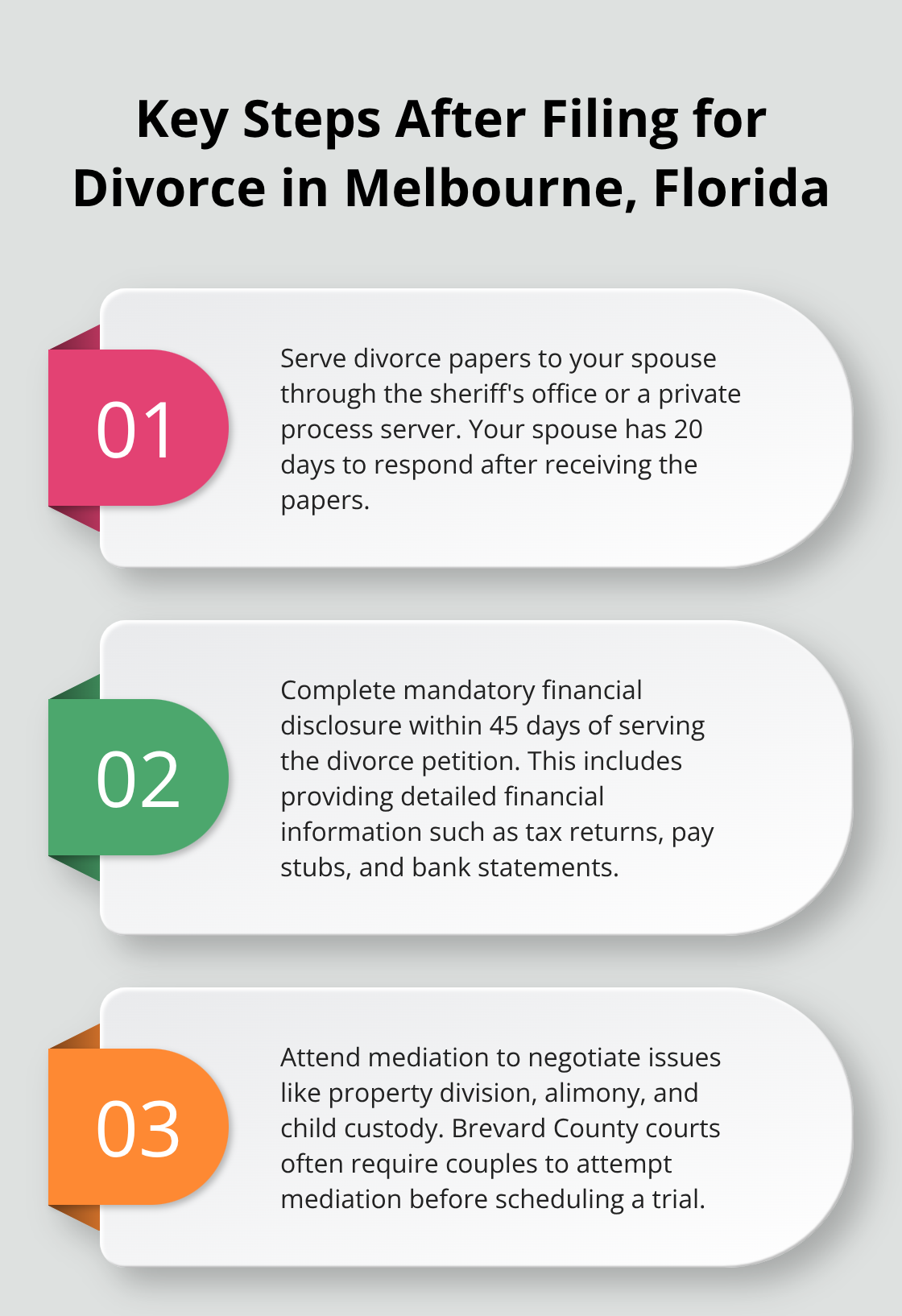The Melbourne Florida Divorce Process Step-by-Step
Our Blog
The Melbourne Florida Divorce Process Step-by-Step

Divorce can be a complex and emotionally challenging process. At Harnage Law PLLC, we understand the difficulties our clients face when navigating the Melbourne, Florida divorce process.
This step-by-step guide will walk you through the key stages of ending your marriage in Brevard County. From filing requirements to resolving important issues like property division and child custody, we’ll provide clear information to help you understand what to expect.
How to File for Divorce in Melbourne Florida
Filing for divorce in Melbourne, Florida requires attention to detail and adherence to specific legal requirements. The process starts in Brevard County, where at least one spouse must have lived for a minimum of six months before filing.
Residency and Grounds for Divorce
To initiate the divorce process, you must prove Florida residency. This typically involves providing a valid Florida driver’s license, voter registration card, or testimony from a witness who can confirm your residency. Florida operates as a “no-fault” divorce state, which means you only need to state that your marriage is “irretrievably broken” to file.
Essential Documents for Filing
The primary document you need to file is the Petition for Dissolution of Marriage. This form outlines your desired outcomes regarding property division, alimony, and child-related issues (if applicable). You must also complete a Financial Affidavit, which details your income, expenses, assets, and liabilities. If children are involved, additional forms such as a Uniform Child Custody Jurisdiction and Enforcement Act (UCCJEA) Affidavit are required.
Filing Fees and Financial Considerations
As of 2025, the filing fee for divorce in Brevard County stands at $408. However, this amount can change, so it’s prudent to check with the Clerk of Courts for the most up-to-date information. If you can’t afford the filing fee, you can apply for a fee waiver by submitting an Application for Determination of Civil Indigent Status. This form asks about your financial situation, and if approved, the court may waive or reduce your fees.
Legal Representation
While it’s possible to file for divorce without an attorney, many individuals choose to seek legal representation to navigate the complexities of the process. An experienced divorce attorney can help ensure all necessary documents are completed accurately and filed on time, as well as provide guidance on your rights and options throughout the proceedings.
The next step after filing for divorce involves serving the divorce papers to your spouse and addressing mandatory financial disclosure requirements. These steps are critical in moving your case forward and ensuring a fair resolution of all divorce-related issues.
What Happens After Filing for Divorce in Melbourne, Florida?
Serving Divorce Papers
After you file for divorce in Melbourne, Florida, your spouse must receive official notification. This process, called “service of process,” involves delivering a copy of the divorce petition and a summons to your spouse. In Brevard County, you have two primary options:
- Sheriff’s Office: You can pay a fee for the sheriff’s office to serve the papers.
- Private Process Server: You can hire a licensed process server to deliver the documents.
Your spouse has 20 days to respond after receiving the papers. If they don’t respond, you might proceed with a default divorce.

Financial Disclosure Requirements
Florida law requires both parties to exchange detailed financial information within 45 days of serving the divorce petition. This “mandatory disclosure” process includes providing:
- Tax returns (for the last three years)
- Recent pay stubs
- Bank statements
- Credit card statements
- Mortgage documents
- Vehicle titles
- Retirement account statements
(This comprehensive list helps ensure transparency and fairness in the divorce proceedings.)
Mediation and Negotiations
Many divorces in Melbourne resolve through mediation instead of going to trial. Mediation involves meeting with a neutral third party to negotiate issues like property division, alimony, and child custody.
Brevard County courts often require couples to attempt mediation before scheduling a trial. This process can save time and money while giving you more control over the outcome. (In 2024, the Florida Dispute Resolution Center reported that 70% of family law mediations resulted in full or partial agreements.)

Temporary Orders
During the divorce process, you might need immediate decisions on matters like child support, spousal support, or temporary custody arrangements. These issues are addressed through temporary orders.
To obtain a temporary order:
- File a motion with the court explaining your request and its reasons
- Attend a hearing where a judge will make a decision
Temporary orders remain in effect until the divorce finalizes or the court modifies them.
The next crucial step in the Melbourne, Florida divorce process involves resolving key issues such as property division, alimony, and child-related matters. These decisions will shape your post-divorce life, so it’s essential to approach them with careful consideration and, ideally, with the guidance of an experienced family law attorney.
How Key Divorce Issues Are Resolved in Melbourne

Equitable Distribution of Property
Florida law mandates equitable distribution of property in divorce cases. This doesn’t always mean a 50/50 split. Courts consider factors such as marriage duration, each spouse’s economic situation, and contributions to the marriage.
The Florida Bar reported that 62% of divorcing couples reached property division agreements through mediation in 2024. (This statistic highlights the effectiveness of alternative dispute resolution methods.) To facilitate this process, we recommend creating a detailed inventory of all marital assets and debts, including real estate, vehicles, retirement accounts, and digital assets like cryptocurrency.
Alimony Determinations
Alimony decisions in Melbourne depend on one spouse’s need and the other’s ability to pay. Florida recognizes several alimony types: bridge-the-gap, rehabilitative, durational, and permanent.
A 2023 study by the Florida Family Law Section found that courts awarded durational alimony in 45% of cases where alimony was granted. Marriage length often influences these decisions – unions lasting over 17 years more frequently result in permanent alimony awards.
To strengthen your alimony case, document your financial situation thoroughly. Include income statements, tax returns, and a detailed budget of your living expenses.
Child Custody and Time-Sharing
Florida has replaced the term “custody” with “time-sharing” to emphasize both parents’ importance in a child’s life. Courts prioritize the child’s best interest when making these decisions.
The Florida Department of Children and Families reported that 58% of divorced parents in the state had equal time-sharing arrangements in 2024. To improve your chances of a favorable time-sharing schedule, demonstrate your active involvement in your child’s life. (Keep records of school activities, medical appointments, and extracurricular events you’ve attended.)
Child Support Calculations
Melbourne courts use the Florida Child Support Guidelines to calculate child support. These guidelines factor in both parents’ incomes, the number of children, and the time-sharing schedule.
In 2025, the average monthly child support payment in Brevard County was $880 for one child. This amount can vary significantly based on individual circumstances. To ensure accurate calculations, provide complete financial documentation, including proof of income, health insurance costs, and childcare expenses.
Proper preparation can significantly impact the resolution of these key divorce issues. Gather comprehensive documentation and understand your rights to position yourself for a fair outcome in your Melbourne divorce case.
Final Thoughts
The Melbourne, Florida divorce process involves several key steps, from filing the initial petition to resolving critical issues like property division and child custody. Understanding these stages will help you navigate the complexities of ending your marriage with greater confidence and clarity. An experienced attorney can guide you through the intricacies of Florida family law, ensure your rights receive protection, and advocate for your best interests.
At Harnage Law PLLC, we provide personalized attention and strategic counsel to help our clients achieve the best possible outcomes in their divorce cases. The Melbourne, Florida divorce process can present challenges, but it also offers opportunities for personal growth and positive change. Take time to focus on your emotional well-being, rebuild your financial stability, and prioritize co-parenting relationships for the benefit of your children.
Seeking knowledgeable legal guidance can make a significant difference in your case’s outcome and your post-divorce life. (A 2024 study found that 78% of individuals who hired an attorney reported feeling more confident throughout their divorce proceedings.) Whether you start the divorce process or face complex issues along the way, professional support will help you navigate this transition more smoothly and set the foundation for a brighter future.
